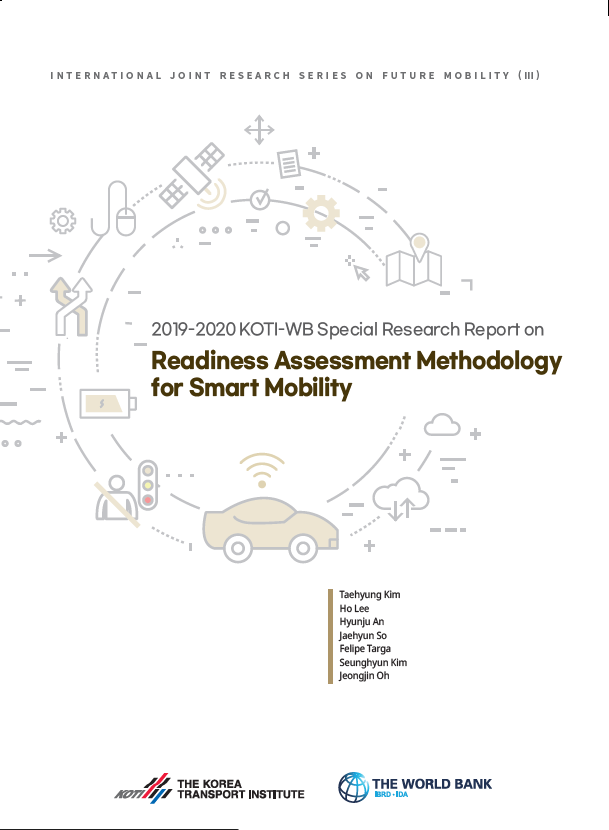Etc Report

RESEARCH
KOTI - Korea Transport institute- Date
September30 2020
- Page(s)
97 page(s)

The smart cities appeared as a solution to the adverse effects of rapid urbanization in the mid-90s such as environmental issues, energy issues, transportation issues and safety issues. Therefore, smart cities are spreading rapidly and competitively throughout the world in order to solve various urban issues efficiently while responding to the 4th Industrial Revolution proactively and creating new growth engines. Smart mobility which is one of key service fields for smart city is also spreading promptly in linkage with the previous advanced transport system such as intelligent transport systems (ITS).
However, while various Smart City construction projects are being undertaken by national and regional governments throughout the world, uniform Smart City designs and strategies are replicated to different cities and regions which often disregards region-specific characteristics. Hence, the purpose of this study is to develop the readiness assessment methodology applicable to smart mobility strategies/solutions, and for enabling developing countries to strategically plan and implement smart mobility strategies/solutions customized to their local context.
Smart mobility is a relatively new concept and there is no single universally agreed definition around the concept. Based on the existing studies on smart mobility concept and case studies, we developed and proposed a smart mobility concept in form of ‘MATRIX’ according to key goals and level of smart mobility services. As a result, such concept was established by presenting the services for smart mobility in accordance with the four key goals: 1) Improve transportation welfare, 2) Reduce traffic Congestion, 3) Enhance transportation safety, 4) Promote air quality and environment, and three implementation levels: 1) Required service (Level 1), 2) Expanded service (Level 2), 3) Future service (Level 3) respectively. It is expected that the classification of smart mobility services in form of matrix will be utilized by developing countries when they select a service for implementing the smart mobility that fits each country or city.
Smart mobility implementation readiness will involve a systematic analysis of country/city’s status in terms of transport/ICT infrastructure resource/data standards and demand for smart mobility solutions, prior to determining the smart mobility implementation strategy in a specific country or city. Hence, three diagnosis items were set to diagnose the level of smart mobility service provided in evaluation target site. In other words, the current smart mobility conditions of evaluation target site were diagnosed through the level of physical infrastructure built on the target site, the level of digital infrastructure which collect, process, and provide data, and the level of operational infrastructure which can more effectively operate and support these infrastructures.
We derived the evaluation indexes required for service implementation in the three diagnosis items and the criteria for evaluating the indexes. Finally the evaluation methods and evaluation scores of the detailed evaluation criteria were suggested as differentiated evaluation scores depending on whether operation is working (operating or non-operating) and the level of operation. To demonstrate the effectiveness of the readiness assessment methodology for smart mobility, Hanoi, Vietnam was selected as a pilot city and the case study was conducted.
Acknowledgement ii
Executive Summary iii
Chapter 1. Introduction and Overview 1
1. Background and Purpose of Study 4
2. Scope of Work 5
Chapter 2. Concept Design of Smart Mobility and Relevant Services 7
1. Definition of Smart Mobility 9
2. Drawing of Smart Mobility Services 15
3. Classification of Smart Mobility Services by Key Goals and Service Levels 23
Chapter 3. Level Diagnosis of Smart Mobility 25
1. Definitional and Conceptual Analysis 27
2. Evaluation Methodology on Smart Mobility Service Level Diagnosis 30
3. Derivation of Smart Mobility Service Evaluation Methodology 54
Chapter 4. A Case Study in Hanoi 59
1. Selection of cities for case study and the analysis of project conditions 61
2. Diagnosis and evaluation of service infrastructure level 74
3. Selection of services and drawing of projects (plans) 77
chapter 5. Implication and Lessons 81
Implication and Lessons 83
References 85